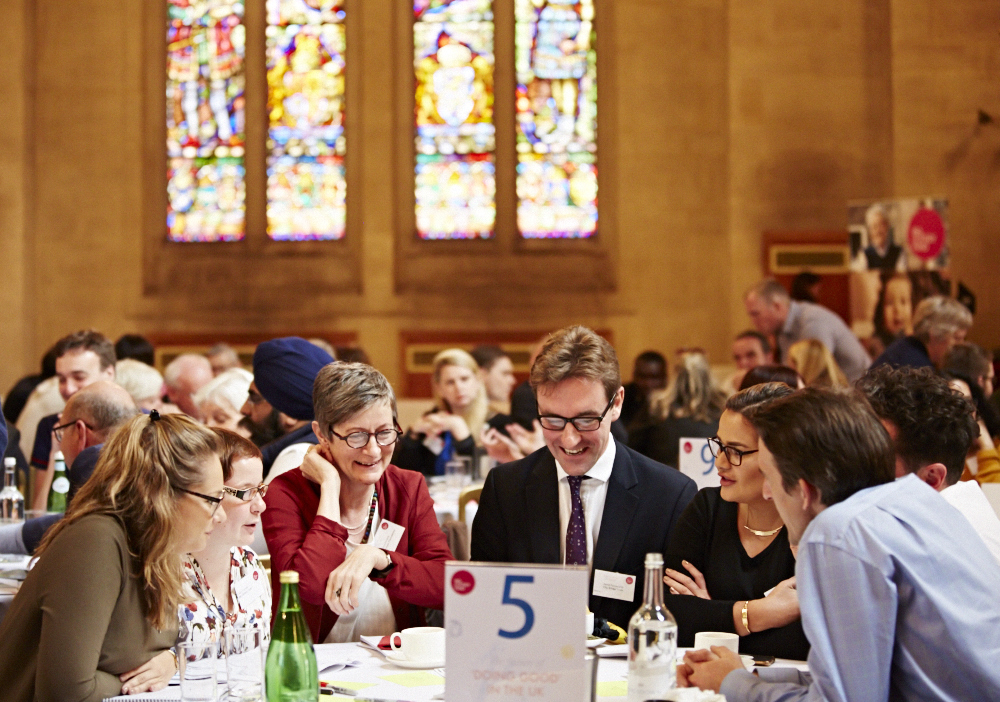Last week we welcomed 100 people from across UK civil society to the impressively renovated Dutch Hall in London, to debate ‘the future of doing good’. For us at the Big Lottery Fund, this was borne out of a desire to better understand how we support a thriving civil society; an ambition I’m sure most Alliance readers will share. But we are also acutely aware of the much bigger picture beyond our own funding; with tough questions about how society is changing and the challenges and opportunities confronting people and communities. So in an attempt to catalyse a much wider discussion, we decided to bring together a room of thoughtful and influential folk.
Our starting point was an excellent report we commissioned from journalist Sonia Sodha, ‘the future of doing good in the UK’ – a wide exploration of the knotty and complex issues that different actors across civil society are grappling with. If you haven’t already read it, please do take a look. It has a UK focus but the themes and challenges it covers resonate more widely. And indeed, discussions on the day yielded a host of insights that ought to pique the interest of philanthropists and civil society actors across the world. We’ll be sharing those in the coming weeks via our dedicated blog site, but in the meantime I’d like to share three initial reflections.
The return of righteous anger
There was a strong current of ‘righteous anger’ in the room, although the need for civil society to express any form of anger at all was contested. Someone asked the question ‘when as a society we accepted homelessness in our rich country’ and more broadly, how do we engage with institutions to bring about social change? I think that’s a function that funders and practitioners elsewhere in the world are actively engaged with, such as the work of the Avina Foundation in Latin America to make municipal governance more participatory, or the Proteus Fund’s Civil Marriage Collaborative initiative in the U.S. And those examples highlight two things we’ll look to explore further in this ‘Future of Doing Good’ conversation – one around how we can support people to take the lead in the local communities, and one around leadership in the sector…
Leadership
Leadership was an emerging theme in a number of contexts, at individual, community, organisation and sector levels. It’s clear that different actors are all grappling with their own unique challenges, but there is also real interest in how we collectively lead social change. This is all about our place and role in the ecology in which we work, beyond the confines of our own organisation. One example from the UK is the Catch 22 Fellowship scheme. Catch 22, as a large national charity, have developed an 18 month scheme for social entrepreneurs to give them space and resources to work on new and transformative ideas. It’s not about developing new intellectual property for the organisation, but about fertilising the soil it has its own roots in. For me these are acts of ‘generous’ leadership.
And we need to think collaboratively about leading social change. One example coming out of the event last week was offered by the Marks and Spencer sustainable business team. They talked about only ever being able to take half a step forward with sustainability initiatives at a time, or they lose customers. So they need to work with others in the same market (who might be natural competitors) to sustain change, and they also work with civil society organisations who can play a role in advocating for new social norms (and therefore influence consumer habits and expectations).
Generational shifts
Amongst our audience were a number of very impressive ambassadors from UpRising, a UK-wide youth leadership development charity. They challenged the older ones among us(!) to think about what a ‘fit for purpose’ civil society looks like to future generations. It seems apparent that younger people expect to have a more direct relationship with the causes they support. And that doesn’t just mean social media – Charities Aid Foundation’s 2014 UK giving report found that younger donors were more likely to give cash rather than online, and Mintel’s research last year suggested that feeling an active part of their local community was a key driver for young people (for 1 in 5 16-24 compared to 1 in 10 for those aged 35-54). And yet, only 2% of UK charities have a young trustee.
If the UpRising ambassadors who joined us last week are anything to go by, this is about a desire to have a meaningful impact on their local areas and an impatience with institutions that are slow to respond or altogether closed to collaboration. Indeed, many younger people are ‘form neutral’ – they just want to make the world a better place. Katherine Fulton has documented the democratisation of philanthropy well – through online marketplaces, mass collaboration, and aggregated giving. Last Tuesday’s event highlighted the increasing demand for philanthropy that can be open, connected and agile.
It’s an interesting (and saddening) paradox that young people today are more hardwired to connect and collaborate than ever before, yet report striking levels of loneliness (more so even than the over 55s). There’s surely an opportunity here for civil society to both empower younger people and harness their natural capacity for collaboration.
If you’re interested in finding out more about the ‘future of doing good’ conversation then take a look at our blogsite – and if you’ve got some reflections on the report or my blog you’d like to share then please do contact me or Rob Field (Robert.field@biglotteryfund.org.uk).
Twitter: @dawnjaustwick







Comments (0)